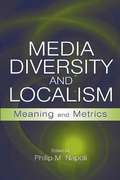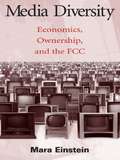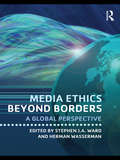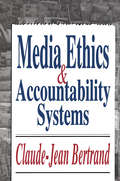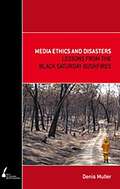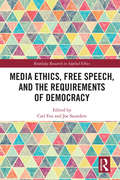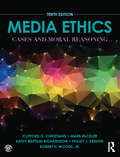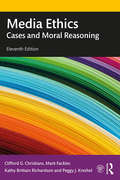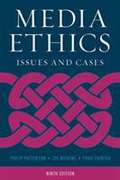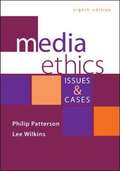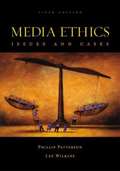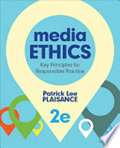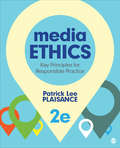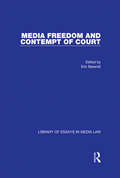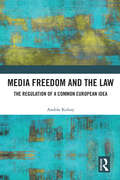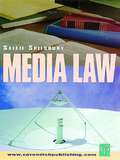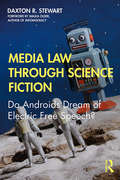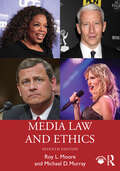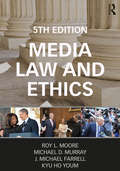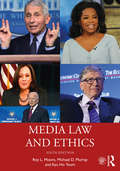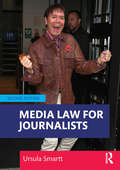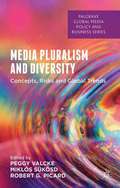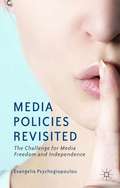- Table View
- List View
Media Diversity and Localism: Meaning and Metrics (Routledge Communication Series)
by Philip M. NapoliQuestions concerning the quality of media performance and the effectiveness of media policymaking often revolve around the extent to which the media system fulfills the values inherent in diversity and localism principles. This edited volume addresses challenges and issues relating to diversity in local media markets from a media law and policy perspective. Editor Philip M. Napoli provides a conceptual and empirical framework for assessing the success/failure of media markets and media outlets in fulfilling diversity and localism objectives. Featuring well-known contributors from a variety of disciplines, including media, law, political science, and economics, Media Diversity and Localism explores the following topics:*media ownership and media diversity and localism;*conceptual and methodological issues in assessing media diversity and localism;*minorities, media, and diversity; and*contextualizing media diversity and localism: audience behavior and new technologies. This substantive and timely volume speaks to scholars and researchers in the areas of media law and policy, political science, and all others interested in media regulation. It can also be used in a graduate seminar on media policy topics.
Media Diversity: Economics, Ownership, and the Fcc (Routledge Communication Series)
by Mara EinsteinMedia Diversity: Economics, Ownership, and the FCC provides a detailed analysis of the regulation of diversity and its impact on the structure and practices within the broadcast television industry. As deregulation is quickly changing the media landscape, this volume puts the changing structure of the industry into perspective through the use of an insider's point of view to examine how policy and programming get made. Author Mara Einstein blends her industry experience and academic expertise to examine diversity as a media policy, suggesting that it has been ineffective and is potentially outdated, as study after study has found diversity regulations to be wanting. In addition to reviewing diversity research on the impact of minority ownership, regulation of cable and DBS, duopolies, ownership of multiple networks and cross ownership of media on program content, Einstein considers the financial interest and syndication rules as a case study, due to their profound effects on the structure of the television industry. She also poses questions from an economic perspective on why the FCC regulates structure rather than content. Through the presentation of her research results, she argues persuasively that the consolidation of the media industry does not affect the diversity of entertainment programming, a conclusion with broad ramifications for all media and for future research about media monopolies. This volume serves as a defining work in its examination of the intersection of regulation and economics with media content. It is appropriate as a supplemental text in courses on communication policy, broadcast economic and media management, broadcast programming, political economy of the mass media, and media criticism at the advanced and graduate level. It is also likely to interest broadcast professionals, media policymakers, communication lawyers, and academics. It is a must-read for all who are interested in the media monopoly debate.
Media Ethics Beyond Borders: A Global Perspective
by Stephen J.A. WardThis volume explores the construction of an ethics for news media that is global in reach and impact. Essays by international media ethicists provide leading theoretical perspectives on major issues and applies the ideas to specific countries, contexts and problems, addressing such questions as: Are there universal values in journalism? How would a global media ethics do justice to the cultural, political, and economic differences around the world? Can a global ethic based on universal principles allow for diversity of media systems and cultural values? What should be the principles and norms of practice of global media ethics? The result is a rich source of ethical thought and analysis on questions raised by contemporary global media.
Media Ethics and Accountability Systems
by Claude-Jean BertrandOver the last few years, the O.J. Simpson case, then the Lewinsky-Clinton affair, and scores of minor scandals have dominated the US press, often taking precedence over important domestic and international issues. This tabloidization of the news media, both here and abroad, has proved that "the market" cannot insure media quality. In a democracy, for media to function well, they must be free of both political and economic muzzling. The only solution is to add self-regulation, or quality control, by professionals and public to the other two forces, the market and state regulation.In this controversial volume, Claude-Jean Bertrand sets out to define a set of accountability systems--democratic, efficient, and harmless--to insure true freedom and quality of media. This brief, highly literate volume focuses not on philosophical foundations of media ethics or case stories, but on what is now missing in the codes. Many books deal with media ethics but few deal with accountability. Media Ethics and Accountability Systems zeroes in on the many nongovernmental methods of enforcing "quality control," and on the difficulty of getting the media microcosm to accept such accountability. To remedy this lack, Bertrand proposes rethinking existing "media accountability systems," some 30 to 40 in number, and creation of new ones. He observes that existing systems are rooted in four basic approaches: training: the education of citizens in media use and the incorporation of ethics courses in journalistic education; evaluation: criticism (positive and negative) not only from politicians, consumerists, and intellectuals, but from media professionals themselves; monitoring: by independent, academic experts over extended periods of time into the long-term effects; and feedback: giving ear to the various segments of media users and their needs and tastes, rather than scrutinizing sales and ratings.Media Ethics will be of particular interest to academics in the fields of communication and journalism, as well as to the general reader with an interest in public issues and a civic concern for society.
Media Ethics and Disasters: Lessons from the Black Saturday Bushfires
by Denis MullerJournalists do not often get the chance to reflect on the ethical side of their work, and the public they serve knows little about it. What the public sees is often negative: intrusive cameras, shouted questions, rude and aggressive behaviour. But journalists tend to go from one story to the next with little time to think deeply about the impact their work has on the people they cover, or how their professional practices might be refined. Written in collaboration with the Centre for Advanced Journalism at the University of Melbourne, Media Ethics and Disasters: Lessons from the Black Saturday Bushfires gives journalists the chance to reflect on the ethical issues that arose during coverage of the Black Saturday bushfires in Victoria in February 2009, and by doing so to contribute to their professional education. It presents; mostly in their own words; what journalists said about how they responded to the many dilemmas that confronted them and provides insight into the reasons for their actions. For the public this is new territory. The book illustrates the range of ethical problems that journalists confronted at the fire ground. There were good decisions and bad decisions, and the 28 journalists interviewed for the book were remarkably frank about both. There are lessons too for the emergency services. The way they and the media interacted created many difficulties, and the research here shows there is still much to learn about management of the media at disaster scenes.
Media Ethics and Justice in the Age of Globalization
by Shakuntala Rao Herman WassermanThis book brings together a range of perspectives from around the globe to address questions of media ethics and justice both in local contexts and in a transnational, global environment. A common denominator running through such disparate investigations of theories and practices of media ethics and justice in democracies as diverse as India, South Africa, Pakistan, United Arab Emirates and the United States, is how specific media practices relate to the global. There is general acknowledgement that similarities between ethical systems have to emerge in local contexts, rather than the other way around. In the presentation of case studies and philosophical debates, the concept of justice in media ethics is illuminated from various angles. A common theme in these chapters is the acknowledgement that ethics and justice are central to the evolution of a democratic public sphere saturated with media images and narratives.
Media Ethics, Free Speech, and the Requirements of Democracy (Routledge Research in Applied Ethics)
by Joe Saunders Carl FoxHow we understand, protect, and discharge our rights and responsibilities as citizens in a democratic society committed to the principle of political equality is intimately connected to the standards and behaviour of our media in general, and our news media in particular. However, the media does not just stand between the citizenry and their leaders, or indeed between citizens and each other. The media is often the site where individuals attempt to realise some of the most fundamental democratic liberties, including the right to free speech. Media Ethics, Free Speech, and the Requirements of Democracy explores the conflict between the rights that people exercise in, and through, the modern media and the responsibilities that accrue on account of its awesome and increasing power. The individual chapters—written by leading scholars from the US, UK, and Australia—address several recent events and controversial developments in the media, including Brexit, the rise of Trump, Lynton Crosby, Charlie Hebdo, dog-whistle politics, fake news, and political correctness. This much-needed philosophical treatment is a welcome addition to the recent literature in media ethics. It will be of interest to scholars across political and social philosophy, applied ethics, media and communication studies, and political science who are interested in the important issues surrounding the media and free speech and democracy.
Media Ethics: Cases and Moral Reasoning
by Mark Fackler Clifford G. Christians Kathy Brittain Richardson Peggy Kreshel Robert H. WoodsMedia Ethics: Cases and Moral Reasoning challenges readers to think analytically about ethical situations in mass communication through original case studies and commentaries about real-life media experiences. This text provides a comprehensive introduction to the theoretical principles of ethical philosophies, facilitating ethical awareness. It introduces the Potter Box, with its four dimensions of moral analysis, to provide a framework for exploring the steps in moral reasoning and analyzing the cases. Focusing on a wide spectrum of ethical issues faced by media practitioners, the cases in this Tenth Edition include the most recent issues in journalism, broadcasting, advertising, public relations, and entertainment. Visit the companion website at http://www.mediaethicsbook.com/.
Media Ethics: Cases and Moral Reasoning
by Mark Fackler Clifford G. Christians Kathy Brittain Richardson Peggy KreshelMedia Ethics: Cases and Moral Reasoning challenges readers to think analytically about ethical situations in mass communication through original case studies and commentaries about real-life media experiences. This text provides a comprehensive introduction to the theoretical principles of ethical philosophies, facilitating ethical awareness. It introduces the Potter Box, with its four dimensions of moral analysis, to provide a framework for exploring the steps in moral reasoning and analyzing the cases. Focusing on a wide spectrum of ethical issues faced by media practitioners, the cases in this Eleventh Edition include the most recent issues in journalism, broadcasting, advertising, public relations and entertainment. Cases touch on issues and places worldwide, from Al Jazeera to the Xinhua News Agency, from Nigerian "brown envelopes" to PR professional standards in South Africa. Racially divisive language comes up in different communication contexts, as does celebrity influence on culture. A core textbook for classes in media ethics, communication ethics, and ethics in journalism, public relations, and advertising. The companion website [url] contains sample syllabi and lesson plans, PowerPoint presentations, discussion and test questions, and a library of video and other media materials for class use.
Media Ethics: Issues And Cases
by Philip Patterson Lee Wilkins Chad PainterMedia Ethics, Ninth Edition is a diverse, classroom tested compilation of 60 diverse cases that will help students prepare for the ethical situations they will confront in their media careers. Ninety percent of the cases are based on actual events, and authors from many institutions and media outlets contributed both real-life and hypothetical cases. There is a strong focus on ethical theory and practice throughout the book, which works well as both a main text in a media ethics course, and in an "across the curriculum" approach in other media courses. Every chapter has been revised to include the most significant research and thinking about the individual topics in the field, including more attention to emerging ethical theory in the areas of privacy, truth telling, and the political role of the news media. Key updates to the Ninth Edition: A new chapter devoted to the theory and practice of social justice 25 new cases covering current topics as diverse as “weedvertising,” “Doxxing,” drones, and sexual harassment in the newsroom The implications of digital content throughout multiple media industries and platforms Fake news Technological invasions of privacy The blending of entertainment, infotainment, and news
Media Ethics: Issues And Cases, 8th Edition
by Philip Patterson Lee WilkinsMedia Ethics is a diverse, classroom tested compilation of 60 diverse cases that will help students prepare for the ethical situations they will confront in their media careers. Ninety percent of the cases are based on actual events, and authors from many institutions and media outlets contributed both real-life and hypothetical cases. There is a strong focus on ethical theory and practice throughout the book, which works well as both a main text in a media ethics course, and in an "across the curriculum" approach in other media courses.
Media Ethics: Issues and Cases, 5th Edition
by Philip Patterson Lee WilkinsBy combining real-life and hypothetical cases with a succinct introduction to ethical theory, this text helps students prepare for the ethical situations they will encounter in the media professions. It is an ideal choice as the main text in a media ethics course or as a supplemental text in any course in journalism. The new edition reflects changes in the world post 9/11, including the war in Iraq, the Enron and WorldCom scandals, and a new look at media and democracy in light of FCC-approved media consolidation.
Media Ethics: Key Principles For Responsible Practice
by Patrick PlaisanceMedia Ethics: Key Principles for Responsible Practice equips students with the knowledge and critical skill sets they need to develop a solid foundation in ethical thinking and responsible media behavior. The text balances ethics theory with case studies to explain key ethical principles and their application in real-world media practice. <p><p> The book introduces classical and contemporary ethics theory and helps students develop a greater understanding of and appreciation for the deliberative process required for responsible media practice. Dedicated chapters address key ethical principles including transparency, justice, harm, autonomy, privacy, and community. Case studies throughout the book provide examples of media behaviors that have posed real-life dilemmas. These contemporary examples underscore the need for ethical media practice and also set the stage for lively debate and reflection. <p> The third edition includes up-to-date case studies, media research, and ethics theory applications to media technologies. Three new chapters address moral decision-making in everyday life, the key factors involved in being a responsible media consumer, and ethical and policy questions surrounding Big Data and our data-driven media system. <p> Developed to foster ethical thought and decision-making, Media Ethics is the ideal textbook for courses dealing with ethics in journalism, public relations, advertising, strategic communication, and media marketing.
Media Ethics: Key Principles for Responsible Practice
by Patrick L. PlaisanceMedia Ethics: Key Principles for Responsible Practice makes ethics accessible and applicable to media practice, and explains key ethical principles and their application in print and broadcast journalism, public relations, advertising, marketing, and digital media. Unlike application-oriented casebooks, this text sets forth the philosophical underpinnings of key principles and explains how each should guide responsible media behavior. Author Patrick Lee Plaisance synthesizes classical and contemporary ethics in an accessible way to help students ask the right questions and develop their critical reasoning skills, as both media consumers and media professionals of the future. The Second Edition includes new examples and case studies, expanded coverage of digital media, and two new chapters that distinguish the three major frameworks of media ethics and explore the discipline across new media platforms, including blogs, new forms of digital journalism, and social networking sites.
Media Freedom and Contempt of Court (Library Of Essays In Media Law Ser.)
by Eric BarendtThe essays discuss the restrictions imposed by contempt of court and other laws on media freedom to attend and report legal proceedings. Part I contains leading articles on the open justice principle. They examine the extent to which departures from that principle should be allowed to protect the rights of parties, in particular the accused in criminal proceedings, to a fair trial, and their interest in being rehabilitated in society after proceedings have been concluded. The essays in Part II examine the topical issue of whether open justice entails a right to film and broadcast legal proceedings. The articles in Part III are concerned with the application of contempt of court to prejudicial media publicity; they discuss whether it is possible to prevent prejudice without sacrificing media freedom. Another aspect of media freedom and contempt of court is canvassed in Part IV: whether journalists should enjoy a privilege not to reveal their sources of information.
Media Freedom and the Law: The Regulation of a Common European Idea
by András KoltayThe main objectives of media regulation in Europe are to protect media freedom, to ensure the social responsibility of the media, and to prevent harm caused by speech published through the media. This book examines the way in which these are reflected in European legal regimes and jurisprudence at the supranational, regional, and national levels.It addresses the theoretical considerations behind the protection and restriction of media freedom. It starts from the assumption that there is a common European ideal of media freedom as a human right. Apart from EU law, and in many cases similar national regulations, many common points can be identified across Europe in the theoretical underpinnings of this right, and the history of struggles for this freedom in different European countries also shows common features.While the focus is on media freedom in Europe, the work also discusses the uniquely distinct concept of freedom of expression and of the media that is prevalent in the US, the principles of which have a significant impact in Europe. The book uses a comparative method, in part, as it attempts to outline the common regulatory framework for the idea of media freedom on a European scale. The reference to national laws and court decisions is intended to illustrate this picture, looking primarily at what binds European states together.The work will be a valuable resource for those working in the areas of public law, media law, media studies, comparative law, international human rights law, and legal philosophy.
Media Law
by Dr S. R. MyneniThe author determined to write a textbook on Media Law an eminent Journalist about the frame and scheme of the book. The result is the outcome of this volume. The volume is based on the syllabus of Bar Council and different Indian Universities. No textbook writer can claim originality of thought as the author has to explain the prescribed topics based on given references. The reader of this textbook is advised to use this textbook for academic purposes.
Media Law
by Sallie SpilsburyThe aim of this book is to analyse media law in relation to specific areas,both in terms of its practical application and its theoretical framework. Part 1 concentrates on the regulation of media content and is largely written from a pro media point of view. Its central tenet is how far does the English media enjoy freedom of expression and the way in which that impacts on how the media operates. It considers how the Human Rights Act 1998 impacts on the media. Part 2 moves on to look at the regulation of the media industries as a whole. Part 3 focuses on day to day transactions for the media. In particular it focuses on provisions from typical media agreements and aims to provide a context for the law which has been outlined in Parts 1 and 2. The structure of this book bridges the gap between a traditional textbook and practitioner work and provides a book which will be of interest to law degree and LPC students and practitioners.
Media Law Through Science Fiction: Do Androids Dream of Electric Free Speech?
by Daxton R. StewartAttorney and legal scholar Daxton Stewart examines the intersection of media law and science fiction, exploring the past, present, and future of communication technology and policy debates. Science fiction offers a vast array of possibilities anticipating future communication technologies and their implications on human affairs. In this book, Stewart looks at potential legal challenges presented by plausible communication technologies that may arise 20 or 50 or 100 years from today. Performing what he calls "speculative legal research," Stewart identifies the kinds of topics we should be talking about relating to speech, privacy, surveillance, and more, and considers the debates that would be likely to arise if such technologies become a reality. Featuring interviews with prominent science fiction authors and legal scholars, and a foreword by Malka Older, this book considers the speculative solutions of science fiction and their implications in law and policy scholarship. Chapters feature specific literary examples to examine how cultural awareness and policy creation are informed by fictional technology, future societies, and legal disputes. Looking forward, beyond traditional legal research and scholarship to the possible and even very likely future of communication technology, this fascinating work of speculative legal research will give students and scholars of media law, science fiction, and technology much to discuss and debate.
Media Law and Ethics
by Roy L. Moore Michael D. MurrayThis fully revised seventh edition provides a thorough introduction to both the legal and ethical considerations relevant to students pursuing careers in media, law and communication.This comprehensive textbook integrates fundamental legal and ethical principles with cases and examples from both landmark moments and recent history. It incorporates discussion of new technologies and media throughout its coverage of core topics such as intellectual property, defamation and commercial speech. This edition introduces readers to media law in comparative international communication and explores topics such as data mining, artificial intelligence and the dark web. Coverage of recent court cases and congressional hearings bring readers up to date on the evolving discussion surrounding Facebook, X (formerly Twitter), TikTok and today’s other major online sources.This hybrid textbook is ideal for undergraduate and graduate courses in media and communication that combine law and ethics.Online resources, including sample syllabi and a test bank, are available at www.routledge.com/9781032612928.
Media Law and Ethics (Routledge Communication Series)
by Mike Farrell Roy L. Moore Michael D. Murray Kyu Ho YoumMedia Law and Ethics is a comprehensive overview and a thoughtful introduction to media law principles and cases as well as related ethical concerns relevant to the practice of professional communication. This is the fi rst textbook to explicitly integrate both media law and ethics within one volume. Since it integrates both current law and ethical queries, it is ideal for both undergraduate and graduate courses in media law and ethics. Co-author Kyu Ho Youm expands this edition’s international scope, updating and broadening his chapter on international and foreign law. The book also covers the most timely and controversial issues in modern American media. The new fi fth edition has been updated with current events and discusses the potential impact they have.
Media Law and Ethics: A Casebook
by Roy L. Moore Michael D. Murray Kyu Ho YoumThis comprehensive textbook provides a thoughtful introduction to both the legal and ethical considerations relevant to students pursuing careers in communication and media. The fully revised, sixth edition continues to integrate fundamental legal and ethical principles with cases and examples from both landmark moments and recent history. It expands upon the previous edition's exploration of international and non-U.S. law, introduces a new chapter on digital and social media, and incorporates discussion of new technologies and media throughout its coverage of core topics such as privacy, intellectual property, defamation and commercial speech. Coverage of recent court cases and congressional hearings brings readers up to date on the evolving discussion surrounding Facebook, Twitter and today’s other major online players. This hybrid textbook is ideal for undergraduate and graduate courses in media and communication that combine law and ethics. Online resources including chapter PowerPoint slides, study guides and sample teaching materials are available at www.routledge.com/cw/moore
Media Law for Journalists
by Ursula SmarttThis book is both an introductory text and reference guide to the main issues facing journalists today, including social media, fake news, and regulators. The text covers the law of the United Kingdom – including Scots and Northern Irish devolved legislation – as well as human rights and EU laws. This book covers essential areas such as: privacy, confidentiality, freedom of expression and media freedom, defamation, contempt of court, regulation of the print press and broadcast regulation as well as discussions on fake news and how to regulate online harm. There is a section on intellectual property law, covering mainly copyright. Court reporting and how to report on children, young people and victims of sexual offences receive particular attention in this book with relevant cases in user-friendly format. The engaging writing style is aimed to enthuse students, practitioners and lecturers with plenty of examination and practice materials. The text is packed with extensive learning aids including case studies, boxed notes, sample examination questions, appendices of statutes and cases and a glossary. It is intended as a complete course textbook for students and teachers of journalism, media, communications and PR courses, focusing on diploma courses, NCTJ examinations and broadcast journalism courses such as the BJTC. The book’s international focus would also make it ideal reading for journalists from across the world who are working in the UK. The book presumes no prior legal knowledge.
Media Pluralism and Diversity: Concepts, Risks and Global Trends (Palgrave Global Media Policy and Business)
by Robert Picard Peggy Valcke Miklos SukosdAdopting a truly global, theoretical and multidisciplinary perspective, Media Pluralism and Diversity intends to advance our understanding of media pluralism across the globe. It compares metrics that have been developed in different parts of the world to assess levels of, or threats to, media pluralism.
Media Policies Revisited
by Evangelia PsychogiopoulouEvangelia Psychogiopoulou brings together distinguished scholars across a range of academic disciplines to investigate the media's freedom and independence, and the media policy processes, institutional spaces, regulatory practices and instruments that can support the development of free and independent media in Europe.
